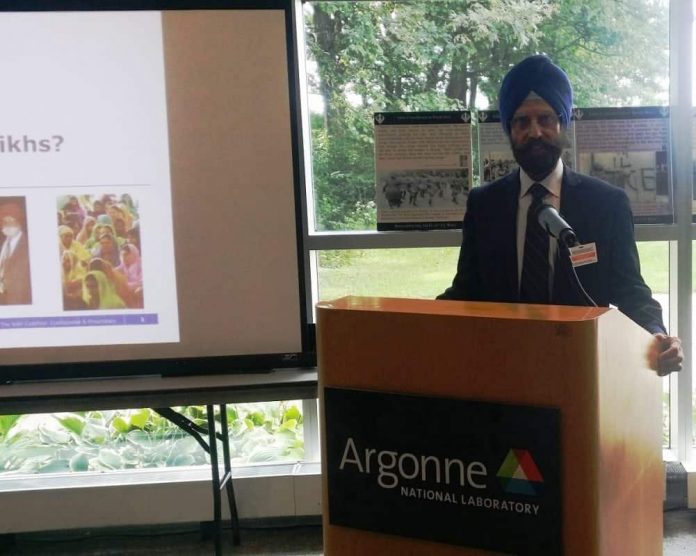Lemont, Illinois: A Sikh religion and culture informational seminar was recently held at the world famous Argonne National Laboratory in Illinois’ Lemont, a suburb of Chicago. The seminar was hosted by the Argonne Alumni Association and it was presented by Rajinder Singh Mago representing Sikh Religious Society, Palatine, Illinois. The presentation was very well received by the curious audience.
“It was an effort to create awareness about the Sikh American community and their culture in a cordial environment. It’s good to know about your colleagues and neighbors. Argonne appreciates diversity and inclusion,” said Rajinder Singh Mago.
The audio visual seminar covered who are the Sikhs, their origin, history, culture, contributions to the world and humanity, their sacrifices, their core beliefs, why they don’t cut their hair, why they wear a turban, carry a kirpan and so on.
 A display table was set up with the Sikh articles of faith, emblems and symbols. There was a lively question-and-answer session and discussion during the presentation and at the lunch tables which cleared up many misunderstandings.
A display table was set up with the Sikh articles of faith, emblems and symbols. There was a lively question-and-answer session and discussion during the presentation and at the lunch tables which cleared up many misunderstandings.
The Sikh religion is the fifth largest religion in the world that originated in Punjab, India, in South Asia.
Argonne National Laboratory is a U.S. Department of Energy multidisciplinary science and engineering research center, where talented researchers work together to answer the biggest questions facing humanity. Argonne National Laboratory is the nation’s first national laboratory and conducts leading-edge basic and applied scientific research in virtually every scientific discipline.
 Argonne has employees from more than 60 nations, including India, who work closely with researchers from hundreds of companies, universities, and federal, state and municipal agencies to help them solve their specific problems, advance America’s scientific leadership and prepare the nation for a better future.
Argonne has employees from more than 60 nations, including India, who work closely with researchers from hundreds of companies, universities, and federal, state and municipal agencies to help them solve their specific problems, advance America’s scientific leadership and prepare the nation for a better future.
Argonne is managed by University of Chicago Argonne, LLC for the U.S. Department of Energy’s Office of Science.












Comments are closed.